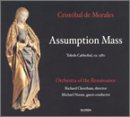| All Artists: Cristobal de Morales, Bernardino de Ribera, Antonio de Cabezon, Andres de Torrentes, Graduale Romanum, Toul Anonymous, Plainchant Chant, Francisco Guerrero, Gregorian Chant, Rodrigo de Ceballos, Michael Noone, Orchestra of the Renaissance Title: Cristóbal de Morales: Assumption Mass Members Wishing: 1 Total Copies: 0 Label: Glossa Release Date: 10/30/2001 Genres: Pop, Classical Styles: Vocal Pop, Opera & Classical Vocal, Chamber Music, Sacred & Religious, Symphonies Number of Discs: 1 SwapaCD Credits: 1 UPCs: 675754447823, 8424562214040 |
Search - Cristobal de Morales, Bernardino de Ribera, Antonio de Cabezon :: Cristóbal de Morales: Assumption Mass
 | Cristobal de Morales, Bernardino de Ribera, Antonio de Cabezon Cristóbal de Morales: Assumption Mass Genres: Pop, Classical
|
Larger Image |
CD Details |
CD ReviewsCristóbal de Morales: Assumption Mass Gary Towne | Grand Forks, ND USA | 03/25/2007 (5 out of 5 stars) "Spanish music and its history, although of globe-girdling significance, has often suffered from anglophone writers, at worst contempt and at best neglect, ever since Spain was branded the evil empire in 1588. Only in recent decades have scholars begun to correct this monumental omission. Michael Noone is becoming one of the leaders of the cause. Let me admit up front that I have known Michael for 25 years, although we have actually met only a few times during that period. Partly because I have followed his career, I was thrilled when he began issuing recordings of the music that has been the object of his devotion. Cristóbal de Morales: Assumption Mass is the third of four recordings he has done on Glossa with Richard Cheetham's Orchestra of the Renaissance (the others: Canticum Canticorum, Francisco Guerrero-Requiem, and Sebastián de Vivanco-In Manus Tuas).
One of his purposes in these recordings has been to convince the world that the combination of singers with cornett, shawms, sackbuts, dulcian, organ, and harp that is described in the records actually works. He proves it, in spades! The performances on these recordings are among the most musical interpretations of sixteenth-century polyphony I have ever heard. Given the limitation that it is all sacred music, the mood, style, and instrumentation show great variety: vocal, instrumental, polyphony, chant, ensemble, solo. The Assumption Mass (and the Guerrero Requiem) are liturgical reconstructions of scholarly precision, while the other two recordings are anthologies. All are superbly performed and definitively refute scoffers who assert that this music or these instruments cannot be performed to modern standards. The performances include spare, stark Gregorian chant as well as rich, voluptuous polyphony. The shaping of musical lines, timbre, and intonation are exquisitely refined. Tempos are beautifully controlled and absolutely convincing. These performances combine consummate musicianship with meticulous musicology, evident in the use of instrumentation described in local period documents and local Gregorian chant, not to mention the fact that Michael Noone has transcribed this music and done the archival research himself. His soup-to-nuts productions are archetypal illustrations of what can be achieved by the combination of excellent scholarship and exemplary musicianship. This is also evident in the exceptionally clear and informative program notes. Michael Noone's sumptuous recordings of Spanish Renaissance Music should grace the shelves of every audiophile. I have bought them all, and these days, I find myself listening to little else!" |

 Track Listings (22) - Disc #1
Track Listings (22) - Disc #1